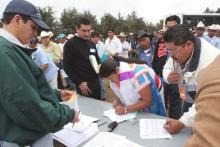Land Library Search
Through our robust search engine, you can search for any item of the over 73,000 highly curated resources in the Land Library.
If you would like to find an overview of what is possible, feel free to peruse the Search Guide.
/ library resources
Showing items 1 through 9 of 17.This report was produced for the Global
Program on Forced Displacement and describes why and how to
conduct political economy analysis (PEA) of forced
displacement. It also illustrates how PEA may contribute to
Croatia, the newest member-state of the
European Union (EU), undertook significant justice reforms
during the last decade. Many were part of its
justice-related EU accession process, including the
Se trata de un caso de acceso a la tierra vía adjudicación estatal, gracias a los programas de compra de tierras a terratenientes, donde los descendientes,que heredan la tierra, se constituyen en asociación para la generación de abono orgánico y la producción sostenible.
An Act to provide for measures to curb organized attempts to grab lands whether belonging to the Government, wakf or the Hindu Religious Institutions and Charitable Endowments, local authorities or other statutory or non-statutory bodies owned or controlled or managed by the Government.
La comunidad campesina de la finca La María – Hato Frío, dentro de iniciativas organizativas campesinas de los años 60, llevó a cabo tomas de tierras acaparadas por el latifundio.
These Guidelines seek to enable wider
and more consistent engagement in the realm of conflict
management within the sector. The objective is to achieve,
as far as possible, negotiated settlements in the resolution
After more than 35 years, the elected
local government system in Lesotho was reestablished in 2005
through the election of the Local Authorities, i.e. the
Community and District Councils (CCs and DCs). Across the
Uganda’s northern region was traditionally inhabited by communities with predominantly pastoral lifestyles. As the country began developing administrative structures in the region, most clans found themselves settled into agro-pastoral communities.
30 familias organizadas resisten la expulsión por parte de los hacendados, defendiendo la tierra donde han vivido.




